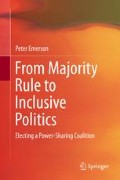Abstract
Given the present structures of political power and the ubiquitous belief in majoritarianism, there will inevitably be many sceptical views on the potential use of the matrix vote. There again, quite a few doubts were voiced when, after the Dark Ages, current majoritarian structures started to develop. And everything always evolves. Today, in this electronic age, preferential voting is certainly feasible, and there is little excuse for a continued reliance on the primitive, divisive, adversarial, hopelessly inaccurate and often sectarian majority vote. Accordingly, with references to current problems in many forums, from the un Security Council to national parliaments and local councils, this chapter examines the potential problems which the introduction of preferential voting in both decision-making and the election of the government might bring; and it then suggests such a consensual polity, based on the separation of powers, on preferential decision-making, and on the collective responsibility of (not just the members of cabinet but of) all the mps, is not only possible but essential… and very democratic.
…it is advisable not to conduct politics as if it were a game: a grand coalition is therefore more appropriate than the government-versus-opposition pattern.
(Lijphart, 1977: 27)
Access this chapter
Tax calculation will be finalised at checkout
Purchases are for personal use only
Notes
- 1.
It should also be pointed out that in this first-past-the-post election, only 48.6 % of the mps, 316 of the 650 total, actually passed the post; only these were elected by a majority of their constituents. They all, nevertheless, firmly believe in majority voting.
- 2.
Over 3,800,000 votes for ukip gave it one mp. Over 1,000,000 Green votes elected one gp mp. It took just 34,000 votes to elect a Tory.
- 3.
Until the election of June 2015, it looked as if Erdoğan was planning for Turkey to allow for a similar concentration of power (Sect. 3.2).
- 4.
This is not to say that mps will never be devious. In a six-option ballot, for example, on options A, B, C, D, E and F, one mp’s favourite may be option C, which he knows to be fairly popular. He might also know that his 2nd preference, option D, is also well liked, and could perhaps defeat option C. In trying to support his own C, therefore, he may give C his 1st preference and option D his 6th.
There is always the possibility, however, that in a tight finish, the consensors may wish to form a composite of the top two or three options. In voting tactically, then, the said mp might have voted for something which was not his true 2nd preference, so might now be getting something he had not wished for.
References
Emerson, P. (1998). Beyond the tyranny of the majority. Belfast: The de Borda Institute.
Lijphart, A. (1977). Democracy in plural societies. New Haven, CT: Yale University Press.
Prunier, G. (1995). The Rwanda crisis. London: C. Hurst and Co.
Schram, S. (1969). The political thought of Mao Tse-tung. New York: Frederick A Praeger.
Author information
Authors and Affiliations
Rights and permissions
Copyright information
© 2016 Springer International Publishing Switzerland
About this chapter
Cite this chapter
Emerson, P. (2016). Will It Work?. In: From Majority Rule to Inclusive Politics. Springer, Cham. https://doi.org/10.1007/978-3-319-23500-4_7
Download citation
DOI: https://doi.org/10.1007/978-3-319-23500-4_7
Published:
Publisher Name: Springer, Cham
Print ISBN: 978-3-319-23499-1
Online ISBN: 978-3-319-23500-4
eBook Packages: Political Science and International StudiesPolitical Science and International Studies (R0)

